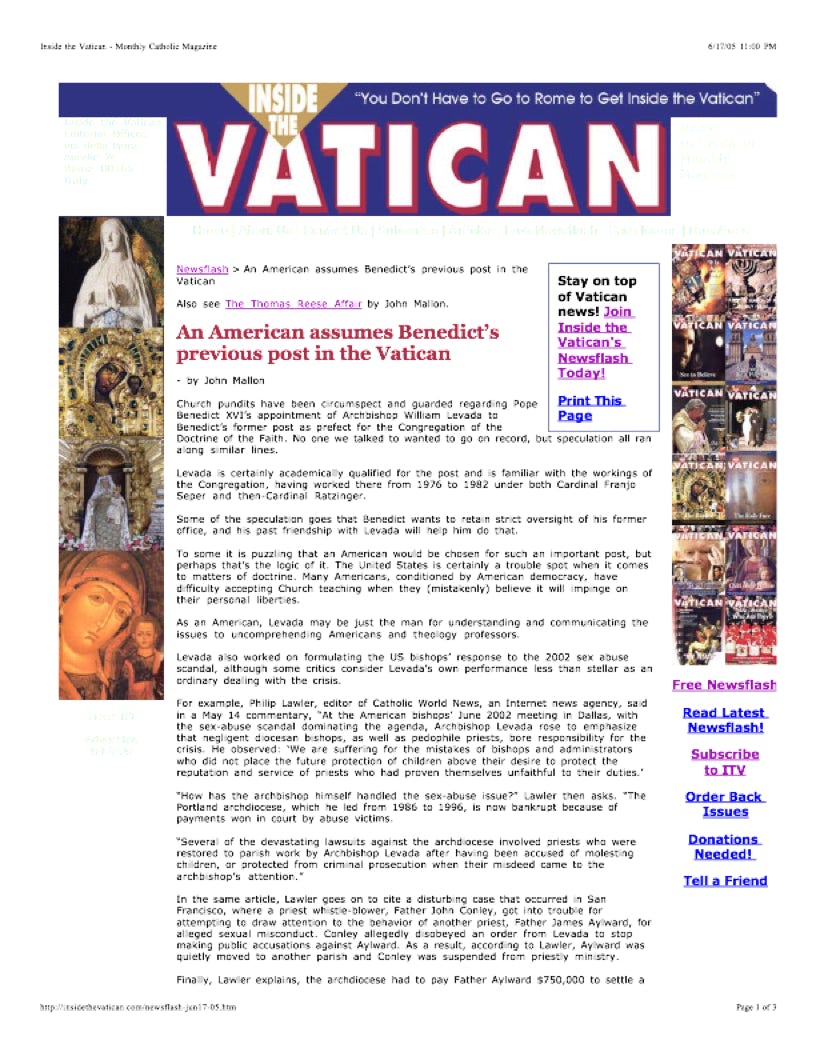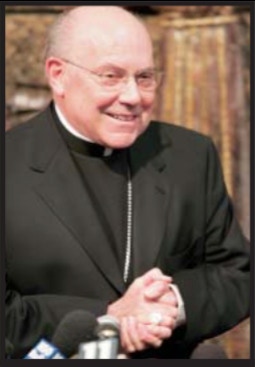

Benedict’s Surprise Pick for CDF
An American Assumes Benedict’s Previous Post in the Vatican
By John Mallon
Church pundits have been circumspect and guarded regarding Pope Benedict XVI’s appointment of Archbishop William Levada to Benedict’s former post as Prefect for the Congregation of the Doctrine of the Faith. No one we talked to wanted to go on the record, but speculation all ran along similar lines.
Levada is certainly academically qualified for the post and is familiar with the workings of the Congregation, having worked there from 1976 to 1982 under both Cardinal Franjo Seper and then-Cardinal Ratzinger.
Some of the speculation goes that Benedict wants to retain strict oversight of his former office, and his past friendship with Levada will help him do that.
To some it is puzzling that an American would be chosen for such an important post, but perhaps that’s the logic of it. The United States is certainly a trouble spot when it comes to matters of doctrine. Many Americans, conditioned by American democracy, have difficulty accepting Church teaching when they (mistakenly) believe it will impinge on their personal liberties.
As an American, Levada may be just the man for understanding and communicating the issues to uncomprehending Americans and theology professors.
Levada also worked on formulating the US bishops’ response to the 2002 sex abuse scandal, although some critics consider Levada’s own performance less than stellar as an ordinary dealing with the crisis.
For example, Philip Lawler, editor of Catholic World News, an Internet news agency, said in a May 14 commentary, “At the American bishops’ June 2002 meeting in Dallas, with the sex-abuse scandal dominating the agenda, Archbishop Levada rose to emphasize that negligent diocesan bishops, as well as pedophile priests, bore responsibility for the crisis. He observed: ‘We are suffering for the mistakes of bishops and administrators who did not place the future protection of children above their desire to protect the reputation and service of priests who had proven themselves unfaithful to their duties.’
“How has the archbishop himself handled the sex-abuse issue?” Lawler then asks. “The Portland archdiocese, which he led from 1986 to 1996, is now bankrupt because of payments won in court by abuse victims.
“Several of the devastating lawsuits against the archdiocese involved priests who were restored to parish work by Archbishop Levada after having been accused of molesting children, or protected from criminal prosecution when their misdeed came to the archbishop’s attention.”
In the same article, Lawler goes on to cite a disturbing case that occurred in San Francisco, where a priest whistle-blower, Father John Conley, got into trouble for attempting to draw attention to the behavior of another priest, Father James Aylward, for alleged sexual misconduct. Conley allegedly disobeyed an order from Levada to stop making public accusations against Aylward. As a result, according to Lawler, Aylward was quietly moved to another parish and Conley was suspended from priestly ministry.
Finally, Lawler explains, the archdiocese had to pay Father Aylward $750,000 to settle a
lawsuit brought by a young man against Aylward.
Then, Conley won a cash settlement in a lawsuit against Levada for being wrongly stripped of his priestly ministry. As part of the finding the archdiocese was required to make an official announcement that “Fr. Conley was right in what he did” when he told the police about seeing Aylward wrestling with a teenage boy. Lawler says, “That concession was all the more noteworthy because, in a deposition, Archbishop Levada had testified that he would not have reported the incident to police.”
As archbishop of San Francisco, Levada had to deal closely with what is already a major issue and promises to become an even greater one. San Francisco is the North American capital — if not the world capital — of homosexuality, and Benedict will certainly need Levada’s insights on this as a pastor who had to deal directly with the issue both pastorally and politically.
A noted theologian, who did not wish to be identified, told Inside the Vatican he felt Levada “made the best of a bad situation” when Levada found a creative compromise when city lawmakers enacted a law requiring all organizations that did business with the City of San Francisco to provide spousal benefits to “domestic partners” of those they employed. This put the local Catholic Charities office in danger of losing government funding if they did not accept a policy that treated same-sex relationships the same as married couples.
The theologian paraphrased Levada’s decision this way: “We do not approve of same sex unions but the state has, in a most disordered manner, allowed them. As many people should have access to health care as possible. The children who have been allowed to be raised in these disordered situations should not be deprived of health care benefits through no fault of their own.”
He also told Inside the Vatican, “Levada is very academic and scholarly ... Also, [Levada and Ratzinger] actually worked together for a while. I have never known Levada to hold anything even suggesting an unorthodox position. How he dealt administratively with those who did is another matter.”
One Jesuit wag suggested that one reason Levada was being moved to Rome was so that Benedict might appoint Jesuit Father Joseph Fessio as archbishop of San Francisco. To say the least, that would be a fascinating development. Fessio has a reputation as a doctrinal hard-liner, but the lesser known side of him is that of being a thoughtful pastor in difficult situations. When contacted for a comment, Fessio said speculations that he might be named bishop of San Francisco are “hallucinations.”
Certainly anyone appointed as archbishop of San Francisco may require a martyr spirit if he is to preach Christ without compromise. In addition to homosexuality, the city is rife with the most radical ideologies and widespread occultism.
Currently serving as provost for Ave Maria University in Florida, Fessio’s home province is San Francisco. Until his recent post he had been stationed there for more than 20 years.
Jesuits, by rule, are required not to seek and even to refuse appointments to high ecclesial office, accepting only under holy obedience.
Fessio has stated privately he has no interest in such appointments, that he can do more good where he is. But Fessio was a prize student of then-Professor Doctor Ratzinger who directed Fessio’s doctoral dissertation.
Two of Fessio’s closest friends and classmates under Ratzinger are now cardinal archbishops of major dioceses, the Primate of Canada, Marc Ouellet, P.S.S., and Christoph Schönborn, O.P., of Vienna. In fact, Fessio might be uniquely gifted to be archbishop of San Francisco.
John Mallon is former editor of Oklahoma City’s diocesan biweekly, the Sooner Catholic. Also see The Thomas Reese Affair by John Mallon.

